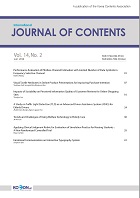- 권한신청
- P-ISSN1738-6764
- E-ISSN2093-7504
- KCI
 ISSN : 1738-6764
ISSN : 1738-6764
The Effect of Service Quality on the Reuse Intention of a Chatbot: Focusing on User Satisfaction, Reliability, and Immersion
장병희 (성균관대학교)
Abstract
This study examined the impact of chatbot service quality (process quality, outcome quality, and servicescape quality) on user satisfaction and reliability by identifying the relationships between user satisfaction, reliability, immersion, and the paths of three variables influencing reuse intention. The survey was conducted of Korean users in their teens and 70s who had experience using chatbot services. A total of 218 convenience samples were extracted and the data analyzed. By the IS success and SERVQUAL model, the results of structural equation modeling revealed that the chatbot service quality did not affect user satisfaction and reliability. However, user satisfaction and reliability of the chatbot services were shown to lead to reuse intention, and user satisfaction was shown to affect immersion and immersion in reliability. The results showed that satisfaction, reliability, and immersion in the chatbot services were important factors in the chatbot reuse intention. Through the satisfaction and reliability gained through the service, the users wanted to reuse the chatbot services, especially the chatbot services that gained reliability, which will have a greater impact on reuse intention. We can use these results as marketing information to attract loyal customers by identifying the reuse intention of the chatbot service users.
- keywords
- Chatbot, IS success model, SERVQUAL, User satisfaction, Reliability, Immersion, Reuse intention
- 다운로드 수
- 조회수
- 0KCI 피인용수
- 0WOS 피인용수

